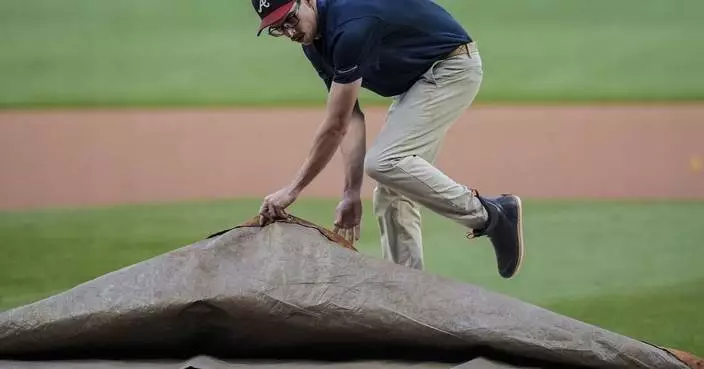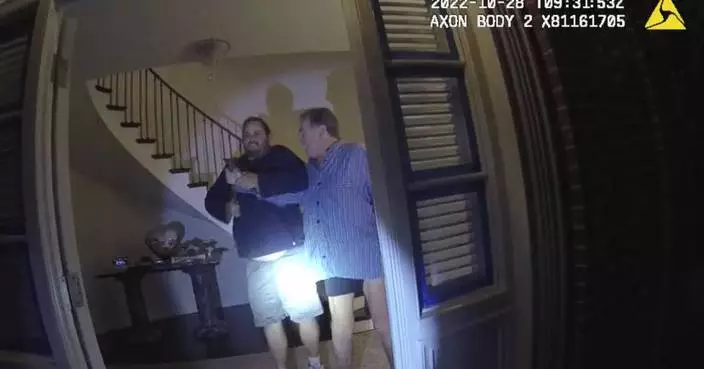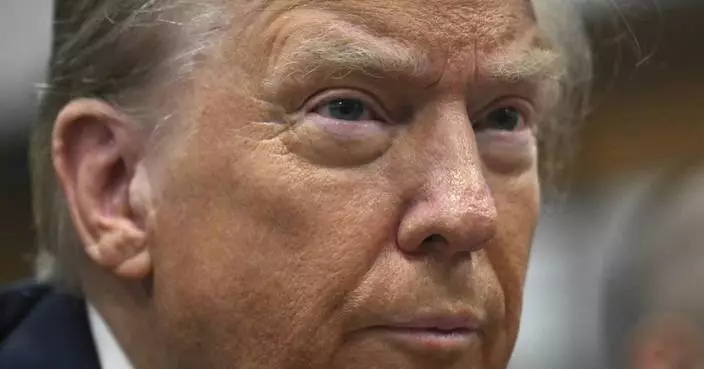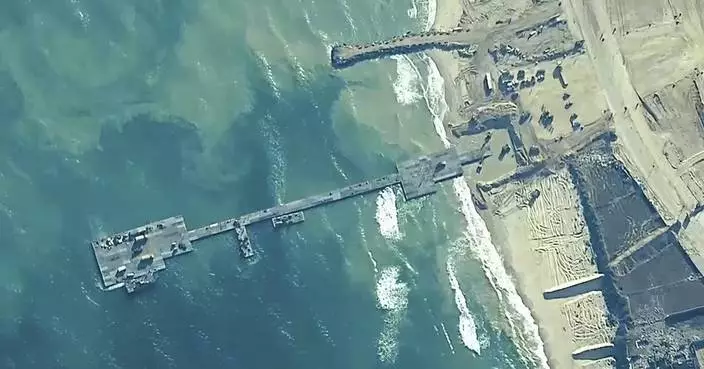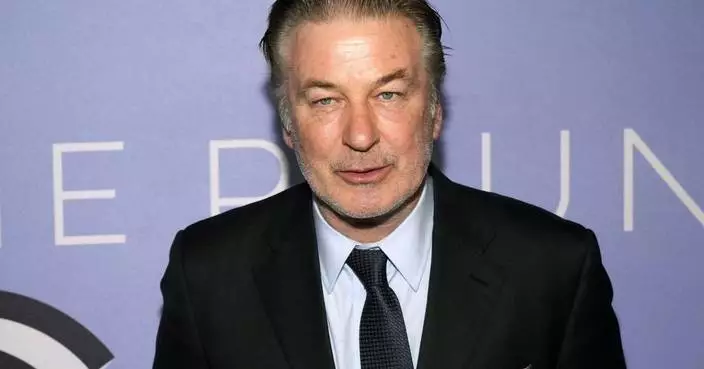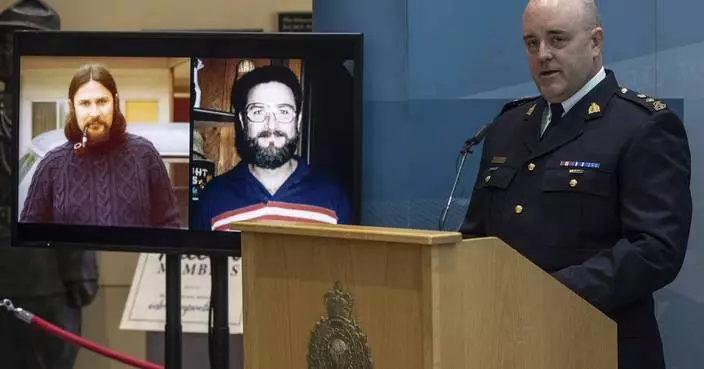President Donald Trump jabbed at the press and poked the eye of the political establishment he ran against in 2016 as he kicked off his reelection campaign with a grievance-filled rally that focused more on settling scores than laying out his agenda for a possible second term.
Addressing a crowd of thousands at Orlando's Amway Center on Tuesday night, Trump complained he was "under assault from the very first day" of his presidency by a "fake news media" and an "illegal witch hunt" that had tried to keep him and his supporters down.
He painted a disturbing picture of what life would look like if he loses in 2020, accusing his critics of "un-American conduct" and saying Democrats "want to destroy you and they want to destroy our country as we know it."
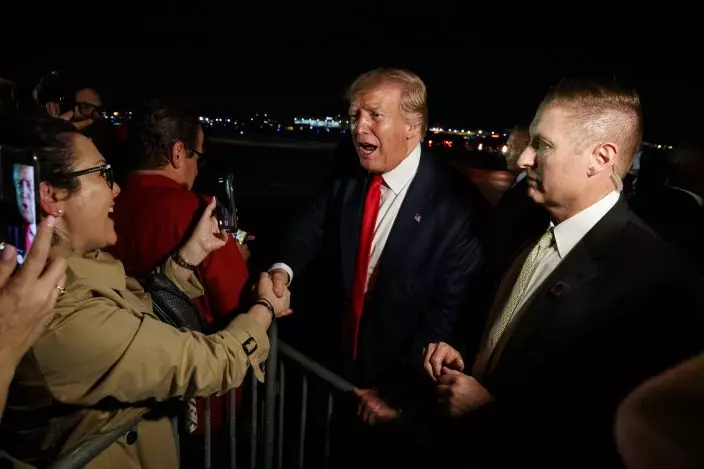
President Donald Trump shakes hands with supporters after arriving at Miami International Airport in Miami, following his re-election kickoff rally in Orlando, Fla., Tuesday, June 18, 2019. (AP PhotoEvan Vucci)
"A vote for any Democrat in 2020 is a vote for the rise of radical socialism and the destruction of the American dream," he said. Trump made only passing mention of any of the Democrats running to replace him even as he tossed out "radical" and "unhinged" to describe the rival party.
The apocalyptic language and finger-pointing made clear that Trump's 2020 campaign will probably look a whole lot like his run three years ago. Even after two-and-a-half years in the Oval Office, Trump remains focused on energizing his base and offering himself as a political outsider running against Washington.
In his speech, Trump spent considerably more time focused on former Democratic rival Hillary Clinton than on his current 2020 challengers, even though she is not on the ballot.
Thousands of Trump supporters began gathering outside the arena on Monday.
"Trump has been the best president we've ever had," said Ron Freitas, a retired Merchant Marine and registered Democrat from Orlando.
Hundreds of anti-Trump protesters clapped and took photos when a 20-foot (6-meter) blimp of a snarling Trump baby in a diaper was inflated. Some members of the far-right hate group Proud Boys were also spotted marching in Orlando outside the rally.
Trump aides scheduled the kickoff near the four-year anniversary of the day when the former reality television star and New York tabloid fixture launched his longshot campaign for president with a famous escalator ride in front of a crowd that included paid actors.
Trump spoke fondly of his 2016 race, calling it "a defining moment in American history." He said that in the years since, he had upended Washington, staring down "a corrupt and broken political establishment" and restoring a government "of, for and by the people."
He never has really stopped running. He filed for re-election on January 20, 2017, the day of his inauguration, and held his first 2020 rally in February, 2017, in nearby Melbourne. He has continued holding his signature "Make America Great Again" rallies in the months since.
Trump asked the crowd whether he should stick with "Make America Great Again" or upgrade his slogan. His new one — "Keep America Great" — was greeted with boisterous cheers.
Trump is hoping to replicate the dynamics that allowed him to take charge of the Republican Party and then the presidency as an insurgent intent on disrupting the status quo. In 2016, he successfully appealed to disaffected voters who felt left behind by economic dislocation and demographic shifts. He has no intention of abandoning that mantle, even if he is the face of the institutions he looks to disrupt.
The president underscored that on the eve of the rally in must-win Florida, returning to the hardline immigration themes of his first campaign by tweeting that next week, Immigration and Customs Enforcement "will begin the process of removing the millions of illegal aliens who have illicitly found their way into the United States."
That promise, which came with no details and sparked Democratic condemnation, seemed to offer a peek into a campaign that will largely be fought along the same lines as his first bid, with very few new policy proposals for a second term.
Early Democratic front-runner Joe Biden said Trump's politics are "all about dividing us" in ways that are "dangerous — truly, truly dangerous."
Another leading Democratic contender, Vermont Sen. Bernie Sanders, said Trump had delivered "an hour-and-a-half speech of lies, distortions and total, absolute nonsense."
But those involved in the president's reelection effort believe that his version of populism, combined with his mantra to "Drain the Swamp," still resonates, despite his administration's ties with lobbyists and corporations and the Trump family's apparent efforts to profit off the presidency.
Advisers believe that, in an age of extreme polarization, many Trump backers view their support for the president as part of their identity, one not easily shaken. They point to his seemingly unmovable support with his base supporters as evidence that he is still viewed the same way he was as a candidate: a political rebel.
Trump tried to make the case that he had made good on his 2016 promises, including cracking down on illegal immigration and boosting jobs.
Near the end of the rally, Trump ran through a list of promises for a second term, pledging a new immigration system, new trade deals, a health care overhaul and a cure for cancer and "many diseases," including the eradication of AIDS in America.
TAIPEI, Taiwan (AP) — In a campaign ad for Taiwan’s President-elect Lai Ching-te, incumbent President Tsai Ing-wen was shown driving with Lai in the passenger seat, exchanging reflections on their years governing together. Tsai later turned over the driving to Lai, who was joined by running mate Bi-khim Hsiao.
The message was clear: Lai would steer the island in the direction set by Tsai, who after eight years in power was barred from running again.
Lai, 64, will take office Monday. Continuing Tsai’s legacy means aiming to strike a balance between cultivating Taiwan’s unofficial alliance with the United States and maintaining peace with China, which claims Taiwan as its own territory, to be retaken by force if necessary.
Lai is also expected to build on some of Tsai’s domestic reforms, despite political gridlock. Lai and Tsai’s Democratic Progressive Party has lost the majority in the legislature, making it hard for Lai to push through legislation, including the approval of crucial national defense budgets.
Tsai, 67, has been Taiwan’s first female president and one of Asia’s few female leaders who didn’t hail from a political dynasty. Her legacy will be tied to defending the island’s sovereignty from China while refashioning it as a credible partner for the U.S. and other democracies. She will also be remembered for overseeing the legalization of same sex-marriage, steering Taiwan through the COVID years and kickstarting the island’s military modernization.
She leaves office with high approval ratings. A recent poll by broadcaster TVBS showed 42% of respondents were satisfied with her eight-year performance. Her predecessor, Ma Ying-jeou, left office with approval ratings of around 23%.
Tsai’s popularity partly reflects a shift in Taiwan’s identity. A vast majority of residents now identify as Taiwanese as opposed to Chinese and want to be governed separately from Beijing. Taiwan and China have had different governments since a civil war in 1949 saw the Nationalists flee to the island while China’s Communist Party took control of the mainland.
Tsai veered from the more China-friendly policies of the previous ruling party, the Kuomintang. By the end of Ma’s tenure, the frequent exchanges with Beijing were making many Taiwanese nervous, said Shelley Rigger, a Taiwan expert at Davidson College.
Beijing called Tsai a separatist after she refused to acknowledge the 1992 Consensus, an agreement which says Taiwan is part of “One China.” While pulling away from Beijing, however, Tsai left a door open for communication.
“President Tsai has always said that Taiwan, under her leadership, is happy, willing and eager to have dialogue with Beijing, just not on terms unilaterally imposed by Beijing,” said Wen-Ti Sung, a fellow with Washington-based think tank Atlantic Council.
China has not only declined to speak to Tsai but also ramped up military and economic pressure on the island, sending warships and military jets near it daily.
Beijing prevents countries it has diplomatic relations with from having formal ties with Taipei. During Tsai’s tenure, it intensified a campaign to lure away the island’s few diplomatic partners. During Tsai’s years in office, China poached almost half of Taiwan’s diplomatic allies, bringing the remaining number to 12.
Tsai pushed back by diversifying trade relationships and increasing military spending including submarine development. She also elevated Taiwan’s standing on the international stage, said outgoing Foreign Minister Joseph Wu.
“Her leadership style is very moderate, but at the same time very firm in dealing with any kind of international pressure,” he said.
“She strengthened awareness of Taiwan around the world and its ties with the international community,” said Bonnie Glaser, the director of the Indo-Pacific program at the German Marshall Fund of the United States.
Lai, who served as vice president during Tsai's second term, came across as more of a firebrand earlier in his career. In 2017, he described himself as a “pragmatic worker for Taiwan’s independence,” drawing Beijing’s rebuke. He has since softened his stance and now supports maintaining the status quo across the Taiwan Strait and the possibility of talks with Beijing.
“Lai has spent the last two-plus years trying to convince the world that he is Tsai Ing-wen 2.0,” said Lev Nachman, an assistant professor at National Chengchi University.
Lai will build on Tsai’s efforts to strengthen ties with the U.S., which doesn’t formally recognize Taiwan as a country but is bound by its own laws to provide the island with the means to defend itself.
By some measures, Lai’s greatest uncertainty on the foreign policy front might come from Washington. A new Donald Trump administration could throw off whatever balance Tsai has achieved in Taipei’s relations with Washington and Beijing, Nachman said.
During Tsai's tenure, Taiwan became the first society in Asia to legalize same-sex marriage, though critics say she skirted political responsibility by leaving the decision up to the Supreme Court and a series of referendums.
She oversaw a controversial pension and labor reform and extended the military conscription length to one year. She also kickstarted a military modernization drive, including a program for building indigenous submarines at more than $16 billion each.
Tsai’s leadership during the COVID pandemic split public opinion, with most admiring Taiwan’s initial ability to keep the virus largely outside its borders but criticizing the lack of investment in rapid testing as the pandemic progressed.
Tsai’s mixed success on the domestic policy front contributed to historically poor results for the DPP in local elections, said Sung with the Atlantic Council. The party’s poor performance in the 2022 elections led to Tsai resigning as party chairwoman. And while Lai won the presidential election, DPP lost its majority in the legislature.
“Much of President Tsai’s government’s success comes from the foreign policy and related international outreach fronts, and in terms of making inroads on the much more grassroots party machinery level, for example, those still have room for improvement,” Sung said.

A supporter of opposition Taiwan People's Party (TPP) holds a guava, symbolizing dishonored ballot during a march to protest against Lai Ching-te's ruling Democratic Progressive party a day before his presidential inauguration in Taipei, Taiwan, Sunday, May 19, 2024. TPP demands that Lai''s government must implement parliamentary, judicial and constitutional reforms. (AP Photo/Chiang Ying-ying)

Supporters of opposition Taiwan People's Party (TPP) stage a rally to protest against Lai Ching-te’s ruling Democratic Progressive party, a day before his presidential inauguration in Taipei, Taiwan, Sunday, May 19, 2024. TPP demands that Lai's government must implement parliamentary, judicial and constitutional reforms. (AP Photo/Chiang Ying-ying)

Supporters of opposition Taiwan People's Party (TPP) gather to protest against Lai Ching-te’s ruling Democratic Progressive party, a day before his presidential inauguration in Taipei, Taiwan, Sunday, May 19, 2024. TPP demands that Lai's government must implement parliamentary, judicial and constitutional reforms. (AP Photo/Chiang Ying-ying)

Supporters of opposition Taiwan People's Party (TPP) march to protest against Lai Ching-te’s ruling Democratic Progressive party, a day before his presidential inauguration in Taipei, Taiwan, Sunday, May 19, 2024. TPP demands that Lai's government must implement parliamentary, judicial and constitutional reforms. (AP Photo/Chiang Ying-ying)

FILE - Taiwan's President Tsai Ing-wen delivers a speech during the naming and launching ceremony of domestically-made submarines at CSBC Corp's shipyards in Kaohsiung, southern Taiwan, Sept. 28, 2023. Taiwan's president-elect Lai Ching-te is set to take office on May 20. Building on the legacy of incumbent president Tsai, Ing-wen means aiming to strike a balance between cultivating Taiwan's unofficial alliance with the United States, and maintaining peace with China, which claims Taiwan as its own territory, to be retaken by force if necessary. (AP Photo/Chiang Ying-ying, File)

FILE - In this photo released by the Taiwan Presidential Office, Taiwan's President Tsai Ing-wen, speaks at a luncheon during a visit by a Congressional delegation to Taiwan in Taipei, Taiwan, April 8, 2023. Taiwan's president-elect Lai Ching-te is set to take office on May 20. Building on the legacy of incumbent president Tsai, Ing-wen means aiming to strike a balance between cultivating Taiwan's unofficial alliance with the United States, and maintaining peace with China, which claims Taiwan as its own territory, to be retaken by force if necessary. (Taiwan Presidential Office via AP, File)

Supporters watch an ad showing then Taiwan Democratic Progressive Party (DPP) presidential candidate Lai Ching-te in a car driven by incumbent president Tsai Ing-wen during a rally held in New Taipei, Taiwan, on Saturday, Jan. 6, 2024. In the campaign ad, Taiwan's president-elect Lai Ching-te and incumbent president Tsai Ing-wen was shown driving steadily on the island's roads with Lai in the passenger seat, exchanging barbs and reflections on their years governing together. (AP Photo/Ng Han Guan)

FILE - Taiwan Democratic Progressive Party (DPP) presidential candidate Lai Ching-te, who also goes by William, is greeted by supporters during an election canvass of a neighborhood in Taoyuan, Taiwan, Jan. 11, 2024, ahead of the presidential election. Lai Ching-te is set to take office as Taiwan's new president on May 20. Building on the legacy of incumbent president Tsai, Ing-wen means aiming to strike a balance between cultivating Taiwan's unofficial alliance with the United States, and maintaining peace with China, which claims Taiwan as its own territory, to be retaken by force if necessary. (AP Photo/Louise Delmotte, File)

FILE - Taiwanese Vice President Lai Ching-te, also known as William Lai celebrates his victory after Taiwan's presidential election, in Taipei, Taiwan, Saturday, Jan. 13, 2024. Lai Ching-te is set to take office as Taiwan's new president on May 20. Building on the legacy of incumbent president Tsai, Ing-wen means aiming to strike a balance between cultivating Taiwan's unofficial alliance with the United States, and maintaining peace with China, which claims Taiwan as its own territory, to be retaken by force if necessary. (AP Photo/Chiang Ying-ying, File)













